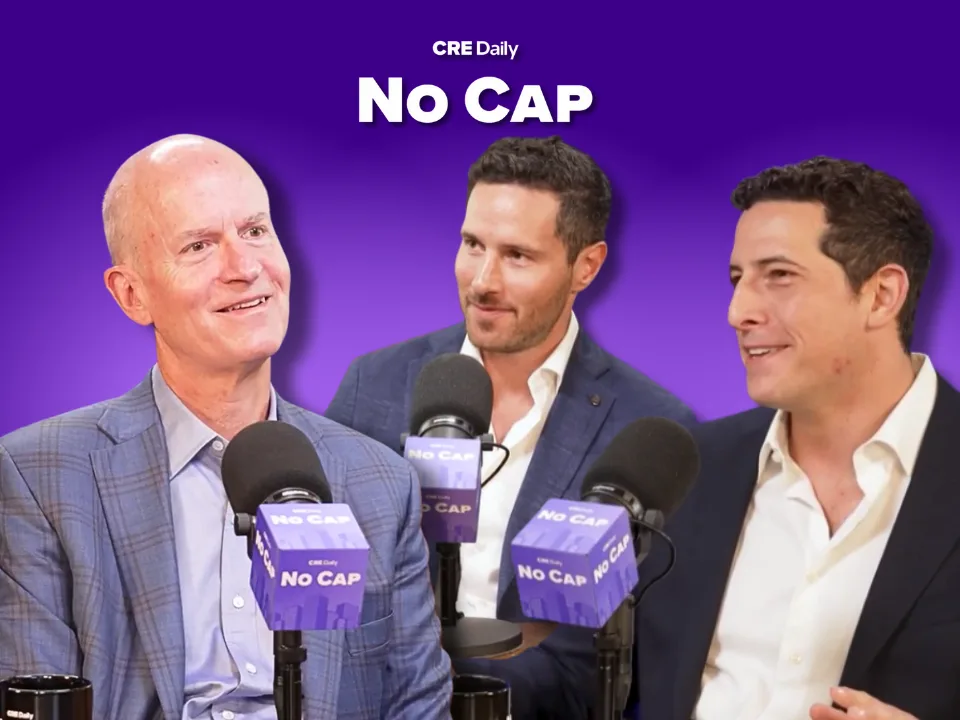Season 4 of the No Cap podcast opens with a heavyweight guest: Owen Thomas, CEO of BXP (Boston Properties), one of the largest office landlords in the US Thomas sits down with hosts Jack Stone and Alex Gornik to reflect on his career from Morgan Stanley to leading BXP, the lessons of Lehman’s bankruptcy, and why the office sector still matters.
He shares candid takes on remote work, office development, regional market dynamics, and AI’s disruption, while grounding it all in his philosophy of leadership, culture, and ethics.
Conversation Highlights
Alex: For those who don’t know your background, how did you first get into real estate?
Owen Thomas: “I grew up on a dairy farm in Virginia. My dad was also a realtor. I worked in his office in high school and caught the real estate bug. After engineering at Texas Instruments, I realized it wasn’t for me. At Harvard Business School I took Bill Porvu’s real estate class, loved it, and joined Morgan Stanley in 1987.”
I always tell my kids and young people today, there’s no such thing as a bad experience because if you have a job and it doesn’t really fit for you, fine, you’ll learn something.
Jack: You also served on the Lehman Brothers board after the collapse. What was that like?
Owen Thomas: “It was the largest bankruptcy in history. At one point there were over a trillion dollars in claims and about a $100B in assets. Seven of us, who didn’t even know each other, were tasked with resolving it. Complicated, but one of the most rewarding projects of my career.”
From Lehman, the conversation turned to how Thomas was tapped to lead BXP.
Alex: How did the move to Boston Properties come about?
Owen Thomas: “In 2013 I succeeded Mort Zuckerman. BXP normally promoted from within, so hiring me was unusual. But I think the board was looking for three things: knowledge of property, financial expertise, and people skills. My Morgan Stanley experience gave me all three.”
Jack: What was BXP like when you first joined?
Owen Thomas: “It wasn’t a turnaround—it was a high-performing company with strong culture. What attracted me was the focus on quality buildings, governance, and ethics. Mort himself was also a big draw—he was a brilliant, fascinating person to work with.”
We then shifted to the office sector and how BXP has navigated its challenges.
Alex: How many “existential crises” has office faced since you’ve been at BXP?
Owen Thomas: “Three. First was densification—people thought nobody would lease space when companies cut square footage per employee. Second was co-working, with predictions that half of office would go flexible. Third, the most serious, was work-from-home. 2024 was the bottom, but now we’re seeing more and more companies return, with more expansions than contractions.”
Jack: What’s BXP’s strategy for office today?
Owen Thomas: “It’s about the premier workplace segment—transit-oriented, amenity-rich buildings. These are under 10% of total supply, probably closer to 15%, but they outperform. Vacancy is around 12% versus 20% for everything else. Asking rents are 50% higher. If you own timeless assets in great locations and nurture them, you capture the inflation benefit.”
The discussion moved into specific markets and development projects.
Alex: Tell us about 343 Madison in New York.
Owen Thomas: “It’s nearly a 1M SF right above Grand Central. Construction costs are up 50% since the pandemic, about $2,000 a SF. We’ve secured a 275,000 SF anchor tenant—larger than I thought we’d get. Premier projects like this still justify development even in today’s environment.”
Jack: And outside New York? How are you balancing markets like DC, Boston, and San Francisco?
Owen Thomas: “In DC we’re doing build-to-suit, like a Metro Center project with two law firms pre-leased at 8% yields. Boston’s next with a Back Bay site, though rents aren’t quite there yet. San Francisco is behind—the overall vacancy rate is in the 30s, high teens even for Class A—but AI companies now represent 15 to 20% of leasing, which is encouraging.”
That naturally led into the role of AI across real estate.
Alex: You’ve called AI the fourth existential crisis. How do you see it affecting office?
Owen Thomas: “AI will disrupt support functions—accounting, IT, back office—but it’s also creating new jobs. Gateway markets are insulated because the companies building AI are expanding. Most of San Francisco’s net absorption right now is coming from AI tenants.”
Jack: What makes an effective leader in your view?
Owen Thomas: “Surround yourself with the best people, create a culture where everyone feels comfortable speaking, and then be decisive when needed. At BXP we focus on quality, ethics, and clear strategy.”
Alex: And how do you personally lead day-to-day?
Owen Thomas: “Constant touchpoints. I’m always talking to colleagues, board members, clients. Big decisions get formal meetings, but most of the job is conversations. The diversity of it is the fun part.”
I think it’s the focus on quality and ethics and always doing things the right way and having a very clear strategy and following it closely.
Watch the full episode on our YouTube Channel or your favorite podcast app.
Tune in weekly for new episodes of No Cap by CRE Daily!

















